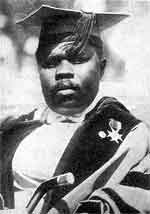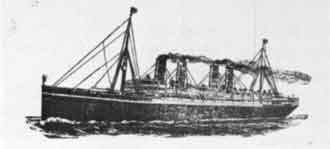Honouring an African leader
August 16, 2002
by Deborah John
 "No one remembers old Marcus Garvey, no one remembers old Marcus Garvey", reggae artiste Burning Spear's plaintive complaint becomes an affirmation ensuring that in essence we never forget his name. "No one remembers old Marcus Garvey, no one remembers old Marcus Garvey", reggae artiste Burning Spear's plaintive complaint becomes an affirmation ensuring that in essence we never forget his name.
Tomorrow is his birthday to be celebrated with bashments throughout the country.
Marcus Moziah Garvey was born in the quiet little town of St Ann's Bay, on the northern coast of Jamaica, on August 17, 1887.
He was named Marcus, after his father, and legend has it that his mother, Sarah, sought to give him the middle name of Moses, explaining prophetically, "I hope he will be like Moses and lead his people," Not a religious man, his father compromised with the less prominent biblical middle name of Moziah.
The Garveys had 11 children but only Marcus, the youngest, and his sister, Indiana, lived to maturity.
When he was 14, family financial difficulties forced Garvey to leave school and go to work. He was apprenticed to learn the printing trade with his godfather, a Mr Burrowes. After two years he left St Ann's Bay to go to Kingston to work at his new trade.
By age 18 he had become foreman of PA Benjamin and Co and in 1908 he headed the printers' strike and was blacklisted.
Subsequently, conscious of the need for organised action to improve the lot of the black worker, he began editing a periodical known as Garvey's Watchman. He was involved in other efforts and in 1912 journeyed to London to learn what he could about the condition of blacks in other parts of the British empire.
He also became interested in the position of blacks in the United States, and it was in London he came across a copy of Booker T Washington's autobiography Up From Slavery.
This book had a profound effect upon him as he later testified: "I read Up From Slavery by Booker T Washington and then my doom—if I may so call it—of being a race leader dawned upon me... I asked... ‘Where is the black man's Government? Where is his King and his Kingdom? Where is his President, his country, and his ambassador, his army, his navy, his men of big affairs?' I could not find them and then I declared, ‘I will help to make them.'"
The seeds of Garveyism had unwittingly been sown.
In the summer of 1914 Garvey went back home to Jamaica, his head spinning with plans for a programme of race redemption. "My brain was afire," he recalled as he considered the possibility of "uniting all the Negro peoples of the world into one great body to establish a country and government absolutely their own".
Back in Jamaica, he contacted some of his old friends and on August 1, 1914, he established the organisation that would occupy his time and energy until his death, the Universal Negro Improvement Association (UNIA) and African Communities League.
UNIA soon boasted of a membership of 4,000,000 members internationally. Garvey also created within the UNIA, the Black Cross Nurses to take care of the sick and disabled Africans.

A poster advertising the Black Star Line Steamship Corp. Sometime in early 1919, Garvey projected the idea of an all black steamship company that would link the coloured peoples of the world in commercial and industrial intercourse. "Now is the time," he said, "for the Negro to invest in the Black Star Line so that in the near future he may exert the same influence upon the world as the white man does today."
Soon, The Negro Factories Co-operation was formed. This co-operative included a chain of groceries, restaurants, steam laundries, small-scale industries and publishing houses and under Garvey's dynamic leadership. The UNIA also founded the Black Star Shipping Line and later, the Black Cross Navigation Co. To further propagate the philosophy of Pan African nationalism, Garvey and the UNIA founded the weekly newspaper, Negro World, which was distributed in America, England, Canada, Africa, the entire Caribbean and almost every corner of the world where Africans lived at that period in time.
Tony Martin writes: "The UNIA was an international movement of massive proportions. At its height in the 1920s it contained over 1,200 branches in over 40 countries. Its membership spread to almost every nook and cranny of the world where African people lived in appreciable numbers.
"In many areas where there were no organised units of the association, individuals could still be found in spirit and who subscribed to Garvey's principles."
It wasn't long before his enemies saw the UNIA as a threat and began to wage a campaign of terror against the UNIA and the progressive works of Marcus Garvey.
This campaign not only arose from the governments of England and the United States, but also from communists and certain African intellectuals, such as WEB Dubois, CLR James, A Phillip Randolph and George Padmore (who would later change his philosophy to Pan Africanism after being rejected by the Communist party).
The UNIA and Garvey's philosophy has often been misinterpreted by many, as being the "Back to African Movement", as being a racist organisation and under the leadership of a racist leader.
Garvey had never advocated total repatriation for all Africans in the Diaspora to Africa. Garvey and the UNIA advocated that Africans in the Diaspora with high technological skills should make their contributions to the development of the Motherland, Africa.
He sent doctors, lawyers, engineers, technicians and other professionals to Liberia as part of the UNIA's contribution to the industrialisation, liberation and unification of Africa and African people.
Before his untimely death on June 10, 1940, in England, Garvey left statements with us that were to be beneficial to all African people, if put into practice at all times. He said:
"The greatest weapon used against African people is disorganisation" and "Africa for the Africans, those at home and those abroad. We have a beautiful history and we shall create another in the future that will astonish the world."
Garvey inspired generations of great Africans, past and present, including: Patrice Lumumba, Kwame Nkrumah, Malcolm X, Elijah Muhammed, Kwame Ture (Stokley Carmichael), Yosef Ben Jochannan and Hoki Madhubuti.
This weekend, various Rastafarian groups and popular entertainment personalities will honour the memory of the Honourable Marcus Garvey on the anniversary of (what would have been) his 115 birthday.
--Additional reporting Nigel Telesford
How Marcus Garvey influenced Trinidad and Tobago
The poetry of Marcus Garvey
Message Board | Articles | History | Rastafari | Homepage
|

